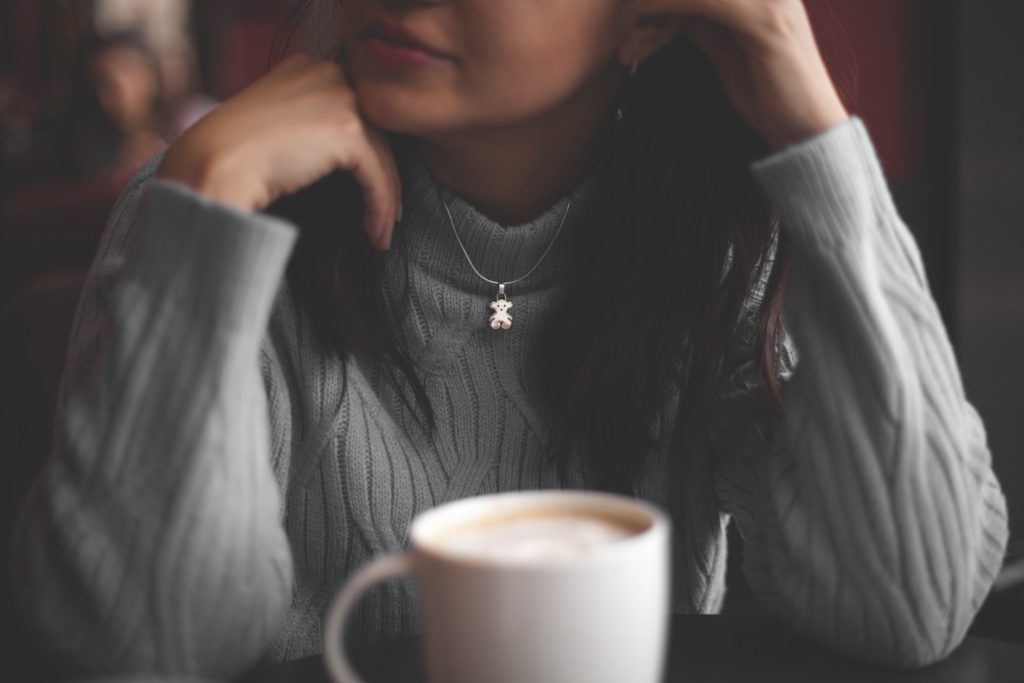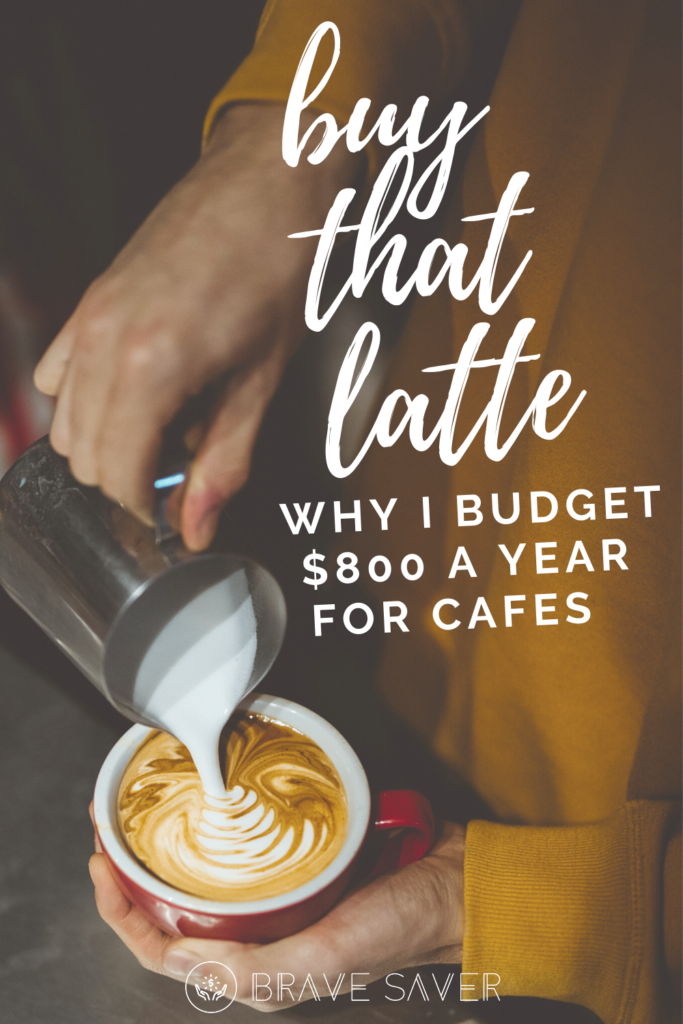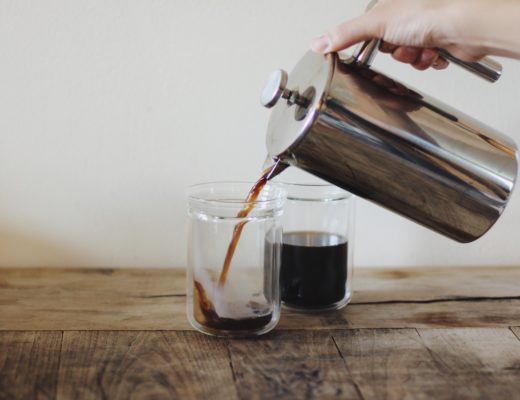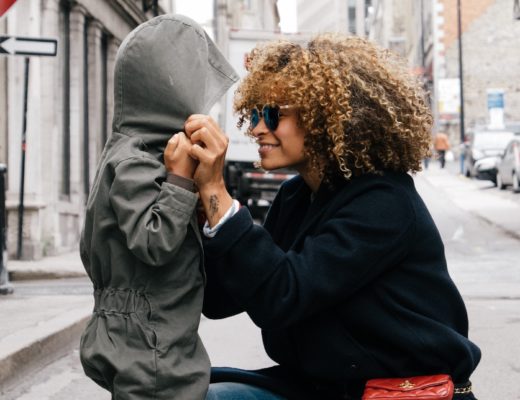
Lattes have been catching a bad rap in personal finance for years. The “latte factor” is used as a prime example of small expenses that add up to big costs. “Look,” these examples say. “You’re spending $5 a day, $1,825 a year — and for what? Steamy bean juice??”
But I’m here to tell you: the latte factor is a lie.
What's in this post
I budget $800 a year for — yes, lattes
And, first of all, the last time I got a latte it was only $3. Okay, $4 with tip.
Second of all, that $4 buys me steamy bean juice, yes. But the value I get out of a latte is so much greater than just a tasty drink or a caffeine high.
Buying lattes at my local coffee shop is an important purchase to me. So important that it’s a line item in my budget. Each month, I have $70 set aside for trips to cafes. In all, I spend around $800 a year. On lattes.
And… that’s a lot of money! The latte factor gets that right, at least. Sometimes I do feel a little guilty about it and wonder if that $70 wouldn’t be better used to save more each month.
And here’s the thing: if it was just coffee? I don’t think I could justify that $70 a month.
But my latte habit isn’t just about a caffeine fix.
There are easier and cheaper ways to get that when I need it. (Though let’s not undersell the power of caffeine, it’s basically the duct tape holding my life together right now.)
What I’m really buying when I buy a latte
The latte factor misses a lot by looking only at the costs of a purchase — and not value. I buy lattes from cafes for so many reasons other than they’re delicious and I don’t have to make them.
Here’s what I get when I buy a $4 latte:
A place to do focused work. I work from home and it’s not always easy for me. Even with a dedicated office, my home is an endless source of distractions. Sometimes a change of scenery helps me get in the zone and crank out some work. At a cafe, that $4 latte gets me a couple of hours of distraction-free work time. (And by comparison, $70 is much cheaper than the $300+ I’d pay for an office or coworking space.)
Relief from social isolation. Another side effect of working from home: I can go days without much face-to-face interaction. The isolation can get rough, especially for an extrovert like me. But I’ve found the ambiance of a cafe with people chatting and coming and going gives me a passive sense of social connection. Working or people-watching in a public space a couple of times a week does wonders to alleviate loneliness.
A reward to keep me motivated. Having a simple something to look forward to can keep me going when I’m having a tough or busy week. I can push through a revision I’m dreading with the promise that I’ll get to head to a coffee shop after. Or I might pair something less pleasant (sending invoices) with a latte to make sure it gets done.
An excuse to meet with friends. I have regular coffee dates with a couple of friends. One is a student and the other is a fellow full-time freelancer, so we usually have something we need to work on. But it’s also so nice to have a convenient option to catch up, chat, and reconnect.
The “latte factor” misses how small expenses add a lot of value to life
The latte factor is used to illustrate the principle that small, thoughtless purchases can add up to big spending. And it is true that there is plenty of mindless purchases that I’ve made that haven’t added much, if anything, to my life.
Even my latte purchases can fall under this category. For about a month this past winter, for example, I got in the habit of grabbing a latte from a drive-through coffee spot right by my daughter’s school. These lattes came with none of the added value mentioned above, and were barely more convenient than just making French-press coffee at home. I noticed this habit, realized it was a waste, and cut it out.
But there’s a key step included in my example: a weighing of value and cost. Instead of following one-size-fits-all financial advice, like “lattes are a waste of money,” I looked closer. And I decided for myself when a purchase like a latte is worth it — and when it isn’t.
How to know if a small purchase is worth it
When I have a thought that I shouldn’t spend my money on something, I ask:
What value does this purchase offer beyond the actual product or service? I try to prioritize purchases that I can leverage to make my life easier and better. Paying $5 for grocery pickup that saves me a painful hour of shopping with kids in tow? One of the best values I can get for $5.
Does this purchase help meet more than one need or want for me? I’ve shared how the latte factor does this for me. But another example is my grocery budget. Yes, I buy food because everyone in my family needs to eat. But I also budget a little more than I technically “need to” because I really enjoy cooking and trying new recipes. It serves the need of feeding me, as well as providing a creative outlet and meditative activity.
Will buying this be in line with my values, desired lifestyle, and identity? A purchase is about more than just what I get out of it right now. Just like small-dollar purchases add up in terms of my budget, they can also add up in terms of my lifestyle and the impact I have on the world.
Do I say “no” to purchases I don’t value? There are plenty of things I don’t bother buying, of course. I don’t care much about designer clothing or bags, for instance. Or having the latest and greatest technlogy or gadgets. Other people do, and that’s great for them!
But I know what is important to me and prioritize that spending. And I know that budgeting to say “yes” to what I want requires that I say “no” to many other low-value purchases.
Small purchases can add up — so make them count
I don’t disagree with the core point of the “latte factor:” That mindless or emotional spending on small purchases can lead to big problems.
But I do think we can lay off of the lattes and other similar purchases. And recognize that it’s not about skipping purchases that I love, but buying them with purpose.
Avoiding waste in my budget is as simple as spending intentionally on what’s meaningful to me. My lattes cost me $70 a month, but the value I get out of them is easily worth three times that amount.
And the reason for that is that I make sure my lattes are more than just lattes. I make them count.
Suggested reading
If you enjoyed this post, here are some similar takes on this topic from bloggers I admire:
- “Just buy the f***ing latte” by Ellevest’s Sallie Krawcheck
- “I Worry More About Fixed Costs and Less About Lattes” by Alyssa at Mixed Up Money
- “The Latte Factor: Why I Started Buying Lattes Again — Without Guilt” by Lisa of Mad Money Monster

Photos by Ilyuza Mingazova and Nathan Dumlao




5 Comments
Rick Sanchez
March 17, 2020 at 6:46 amSeems more like an extrovert in the wrong line of work. If you need to go to a coffee shop to socialize then you probably should look for employment that’s more conducive to your personality than trying to justify spending too much money on bean juice in order to meet people or be around other people
Elyssa Kirkham
March 17, 2020 at 4:58 pmYes, I’m an extrovert. No job is going to check all the boxes. I’m willing to accept some trade-offs for the profession I have.
But does that really mean I’m in the wrong line of work? Can you explain how it would make more sense to refigure my whole career and profession rather than fit $70 a month into my budget for a workaround that is effective and simple?
AMM
March 20, 2020 at 8:57 pmI totally, 100% understand this. Although my (fairly) new job doesn’t have a decent coffee shop within a mile of the office, I had almost the same mindset in my last role where I could stroll over 2-3 times a week and get a nice warm cup of comfort before my depressing 8-hour grind. Luckily, despite my coffee options having been limited, my new job has gotten a lot more interesting so coffee has become less necessary. But if there was one nearby I’d definitely be back to budgeting for it again anyway. 🙂
Mel
March 21, 2020 at 3:10 pmI’m a solid introvert and I like the coffee house ambiance too when I’m working from home a lot. I don’t have to (or want to) talk to the strangers, it’s just nice to be in an environment with others sometimes.
Love this post! I’ve defended the latte cost too a couple of times over the years and totally agree with everything you wrote here. Hopefully we can all be back in the coffee shops soon :0/
Budget Life List
March 22, 2020 at 11:34 pmAs with any purchase, if we can do it with intentional and mindfully then its a justified line item. I am the same way too, not with lattes but with spending when I travel. I love Ellevest’s Just Buy the F***ing latte! I have to say something about Rick he is bananas. Why is he fixating on one small piece of your article? Rick aside this was fun, thank you for that.